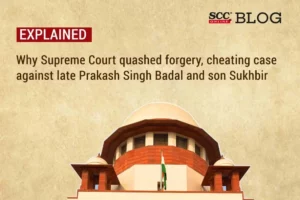Supreme Court: In a criminal appeal the appellants/accused persons filed an appeal against the order of High Court of Punjab and Haryana (‘High Court’), wherein the appellant’s application to quash the criminal proceedings and the summons order was dismissed, the Division-Bench of M.R Shah* and C.T. Ravikumar, J.J., allowed the appeal and set aside the summoning order and entire criminal proceedings against the appellants.
Background
A private complaint was filed against Sukhbir Singh Badal, Sukhdev Singh Dhindsa and Daljit Singh Cheema for offences under Sections 463, 465, 466, 467, 468, 471, 191, 192 of the Penal Code, 1860 (‘IPC’). Prakash Singh Badal was not arrayed as an accused in the said complaint. It was alleged that Prakash Singh Badal, the then President of the Shiromani Akali Dal (‘SAD’), filed an affidavit with the Election Commission of India (‘ECI’), stating that the SAD was adhering to the principles of secularism, but the said affidavit conflicted with the undertaking/affidavit given to the Gurudwara Election Commission (‘GEC’). The earlier affidavit submitted to the GEC was in conformity with the Sikh Gurudwaras Act, 1925, which prescribes that only Sikhs can become voters or contest elections to Shiromani Gurudwara Prabandhak Committee (‘SGPC’). Therefore, it was alleged that the SAD had filed a false Constitution with ECI to gain recognition as a political party.
Thereafter, after a period of nine years, the complainant sought an amendment to the complaint, to add five persons as accused persons. Prakash Singh Badal was introduced as an accused after the said amendment to the complaint and the Trial Court passed summoning orders on 04.11.2019, against the appellants to face the trial for the offences under Sections 420, 465, 466, 467, 468, 471 read with 120-B IPC. Aggrieved by the summoning order, the appellants filed an application before the High Court under Section 482 CrPC to quash the complaint as well as the summoning order dated 04.11.2019.
However, the High Court had dismissed the revision application and refused to quash the criminal proceedings as well as the summoning order. Thus, aggrieved by the High Court’s order, the appellants filed an appeal before the Court.
Court’s Decision
The Court referred to the relevant provisions of the IPC and said that the allegations made in the complaint were not at all appreciable. Further, the Court said that the ingredients for the offence of cheating were not satisfied and there was no question of deceiving any person, fraudulently and dishonestly. As far as the offence under Section 465 was concerned, the Court said that for the offence of forgery, there must be the making of a false document with intent to cause damage or injury to the public or to any person. Therefore, making false documents is sine qua non, and in the present case, no false document was produced. Further, the Court said that according to the complainant, a claim was made at the time of the registration of the Party that it had adopted a memorandum accepting secularism, however, making a false claim and producing a false document both are distinct. The Court also said that on a plain reading, no case was made out for the offences under Sections 466, 467, and 468 of the IPC.
Thus, the Court said that if the criminal proceedings against the appellants were continued as per the summoning order, it would be an abuse of the process of law. Therefore, the entire criminal proceedings against the appellants were quashed along with the summons passed by the Trial Court.
The Court also observed that it had not expressed anything on the Constitution of the SAD and the said order by the Court shall not affect the pending proceedings before the High Court of Delhi against the order of the ECI on SAD’s registration.
Thus, the Court allowed the appeals and set aside the order passed by the High Court wherein the appellant’s revision application was dismissed.
[Sukhbir Singh Badal v. Balwant Singh Khera, 2023 SCC OnLine SC 522, decided on 28-04-2023]
*Judgment Authored by: Justice M.R. Shah

